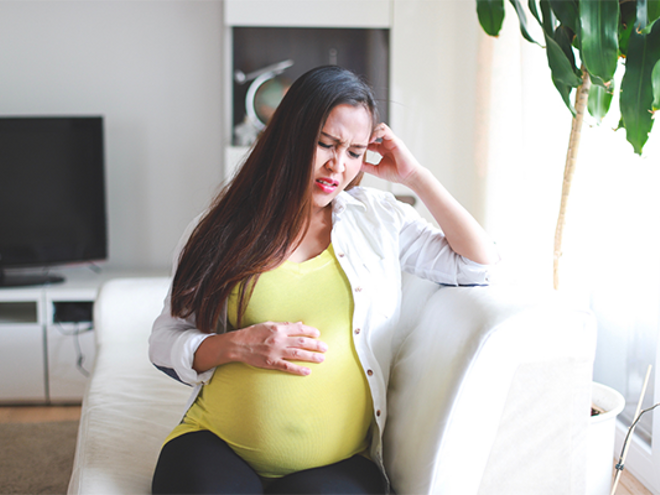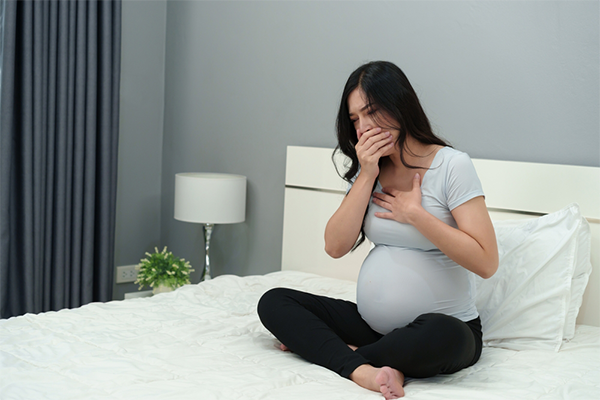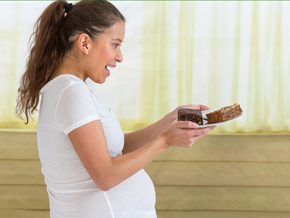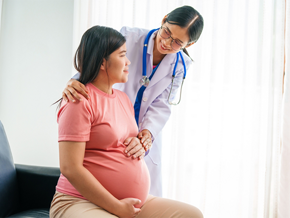
Scrolling through your parenting group (are you in ParenTeam's Moms and Dads Facebook group yet?), you'll probably see that many pregnant women second-guess every sensation as their due date gets closer. One thing that seems to throw them off is heartburn during pregnancy. Is it something they ate, or could it be an early sign of labor?
This guide walks you through how to tell the difference and shares safe, natural ways to ease that burning feeling while you wait for baby. But a reminder though: never hesitate to ask your doctor about your heartburn symptoms because it can also mean something more serious.
Why Does Heartburn Occur During Pregnancy?
You probably know that heartburn is the primary symptom of acid reflux and gastroesophageal reflux disease (GERD). If you've had either condition before, you're more likely to experience heartburn while you're pregnant.
However, pregnancy alone increases your chances of getting heartburn even if you've never dealt with it in the past. A 2022 study in the American Journal of Gastroenterology (AJG) shows that between 30% to 80% of pregnant women experience heartburn at some point.
What makes pregnancy a high-risk factor for heartburn? Two main factors are involved.
Hormonal changes
An article published in Stanford Medicine Children's Health believes pregnancy hormones, especially progesterone, are behind heartburn during pregnancy. These hormones relax the esophageal sphincter, which is located at the top of your stomach.
When the esophageal sphincter relaxes or doesn't close tightly, some of the partly digested food and stomach acid flow back into the esophagus. Plus, Stanford Medicine Children's Health adds, progesterone slows down digestion, meaning food stays in the stomach for a longer time.
Growing uterus
As your baby takes up more space, the uterus puts pressure on the stomach. This pushes acid upward, especially when you're full or lying down.
Why Does Heartburn Feel like Labor?

Many women develop acid reflux during pregnancy with heartburn as the main symptom.
Many pregnant women tend to associate heartburn with an early labor sign because it tends to get worse in the third trimester. Some experience it almost daily during that time, according to the AJG study.
As the baby drops lower into the pelvis (called lightening) in the last few weeks of pregnancy, the stomach gets even more squished, increasing the feeling of heartburn. If you've never really felt heartburn before, or it shows up along with other symptoms, it can seem like part of the labor process.
Besides, when you're full term, you can't help but worry that every new ache or twinge is labor pain, especially if it's your first pregnancy.
Heartburn vs. Labor Pain
Here's a quick look at the symptoms that can help you tell heartburn apart from labor pain.
Heartburn during pregnancy symptoms
Heartburn tends to flare up after meals or when you're resting. You may feel any of the following:
- Burning or tightening pressure feeling behind your breastbone
- A sour or bitter taste in your mouth
- A feeling like a large pill is stuck in your throat
- Urgent need to burp, but you can't
- Throat irritation similar to what you might feel after throwing up
Signs you may be in labor
Labor pains usually build in intensity, follow a pattern, and often come with other signs.
• Contractions that come at regular intervals and keep getting stronger
• Increasing lower back pain or cramping
• A gush or slow leak of fluid (water breaking)
• Pink or blood-streaked discharge (bloody show)
For a more helpful read, this guide on the four stages of labor provides detailed information on what to expect as your due date approaches.
If your "heartburn" feels more like upper stomach pain and comes with symptoms like severe headache, blurred vision, or swelling, call your doctor. These signs suggest preeclampsia, which requires medical attention.
How to Ease Heartburn During Pregnancy

Home remedies for acid reflux during pregnancy include sleeping on your left side and propping your head higher on a pillow.
A 2022 review published in BMC Gastroenterology compiled the recommended lifestyle changes and dietary tweaks to alleviate heartburn during pregnancy from 79 studies. They include:
- Maintain an upright position after eating.
- Avoid eating three hours before going to bed.
- Elevate your head by 10-15 cm (4-6 in) when sleeping.
- Try to lie down on your left side when sleeping.
- Chew gum to increase saliva and neutralize stomach acid.
- Increase physical activity to help with digestion.
- Eat small, frequent meals instead of big ones.
- Drink water throughout the day but limit intake with meals.
- Keep a food diary to identify trigger foods.
Additionally, avoid spicy, oily, or acidic foods. The review also identifies the following as potential trigger foods and beverages for heartburn.
- Fatty or spicy foods
- Chocolate
- Mints
- Caffeinated beverages
- Citrus juices
- Tomatoes
- Carbonated products
If these home remedies do not reduce discomfort from heartburn, your doctor may recommend antacids that are safe for pregnancy.
When to Call Your Doctor
If something doesn't feel right and you're close to giving birth, call or message your doctor, especially in the following situations:
• You're not sure whether it's heartburn or labor.
• Your heartburn is so intense that it's making it hard to eat or sleep.
• You feel burning that doesn't go away, even with home remedies.
• You notice pain that feels different from your usual symptoms.
• You have signs of preeclampsia (severe headache, swelling, vision changes, upper belly pain)
Trust What Your Body Is Telling You
Heartburn is a common and uncomfortable symptom, especially in the third trimester. But it's not usually a sign that labor is starting. They may be similar at times, so knowing what to watch for can make things less stressful.
When in doubt, check your symptoms, see if they follow a pattern, and don't hesitate to call your doctor, whether you think it's labor or heartburn during pregnancy. It's always better to ask. Have a safe delivery!
References
Altuwaijri, Mansour. “Evidence-based Treatment Recommendations for Gastroesophageal Reflux Disease During Pregnancy: A Review.” Medicine 101, no. 35 (September 2, 2022): e30487. https://doi.org/10.1097/md.0000000000030487.
Gregory, David S., Velyn Wu, and Preyasha Tuladhar. “The Pregnant Patient: Managing Common Acute Medical Problems.” AAFP, November 1, 2018. Accessed August 31, 2025. https://www.aafp.org/pubs/afp/issues/2018/1101/p595.html.
Le, Y-l.T., M.N. Luu, L.H. Mai, A.T. Hoang, T.T. Nguyen, and D.T. Quach. “Prevalence and Characteristics of Gastroesophageal Reflux Disease in Pregnant Women.” Revista De Gastroenterología De México (English Edition) 88, no. 4 (July 7, 2022): 341–46. https://doi.org/10.1016/j.rgmxen.2022.06.012.
Johns Hopkins Medicine. “Pregnancy and Heartburn,” August 15, 2024. Accessed August 31, 2025. https://www.hopkinsmedicine.org/health/conditions-and-diseases/staying-healthy-during-pregnancy/pregnancy-and-heartburn.




























